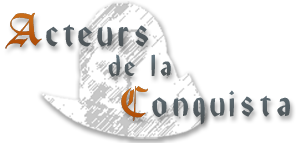Secular priest, born in Seville in the early 16th century, he passed to Indias in 1528, when Oviedo knew him in Panama.
He accompanied Pizarro in the conquest of Peru, as Vicar of the expedition. Unlike Vicente Valverde, who was a regular clergyman (Dominican order), he received his part in the share of the ransom of Atahualpa: 1¾ parts of gold and silver (7 770 pesos of gold and 6/8 310, marks of silver). The most notable is that he was the only one to participate in this distribution, then that he was not present at Cajamarca, being stayed by order of Pizarro, in San Miguel de Piura, first city founded in Peru by Pizarro. He would have accepted this order against the promise to participate in the loot. After the battle of Cajamarca, he hastened to come to be sure to have his share.
He left Peru the following year. Ambitious and influential, he tried to obtain from the Court the authorization to organize expeditions of conquest. This was refused as religious. It nevertheless was the instigator and financier of an expedition in the Veragua (North of the current Panama, Costa Rica and Nicaragua), led by Felipe Gutierrez y Toledo.
He was also the Council of the widow of Diego Columbus (died on 1526), the son of Christopher Columbus. The Columbus family was conducting a trial against the King as to the income of this region that the great Admiral had been the first to discover. This trial ended with the creation of the Duchy of Veragua, which is still hold today by the descendants of the great discoverer.
The expedition of both Gutierrez and Sosa departed in September 1536, turned to disaster. The men died of disease, hunger or under Indian arrows. Scenes of cannibalism were noted in the Spanish troop. The survivors returned to Panama, their instigators ruined.
The enterprising Juan de Sosa then returned to Peru, trying to get jobs. He took advantage of the civil war to obtain the favour of Gonzalo Pizarro, and was Vicar General of the Diocese of Cusco in 1547.
In June 1548, after the defeat of Gonzalo Pizarro, he was sentenced to banishment and confiscation of all his properties. He returned to Spain.
Sources : Oviedo, Historia III, p 185-204








